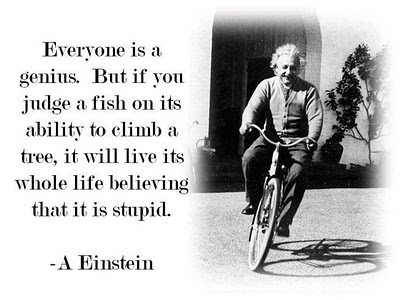Blog
Einstein: Don’t Judge a Fish by its Ability to Climb a Tree!
This inspirational quote has been getting well-deserved attention on the Internet for quite a while now. Give it a read and think about its meaning for a moment; it has particular relevance to the students with whom we work at Engaging Minds.

Very thought-provoking, right? But let’s delve a little deeper.
First of all, there is no real evidence that Mr. Einstein ever uttered or wrote this statement. Neither print literature nor record of his spoken bon mots show the renowned physicist saying such a thing. So why would he be given credit for it? Popular legend (also under debate) is that Einstein had a learning disability and struggled mightily as a child in a traditional Catholic school where the expectations were that he (and his classmates) would follow the prescribed academic routine. The idea that someone who would eventually grow up to be such an intellectual icon initially had scholastic difficulties is inspiring enough to perhaps ignore the evidence to the contrary of his being dyslexic or suffering from some other learning disability. Clearly he had some difficulties in school, something with which many of our students here at Engaging Minds are very familiar. Thankfully, and regardless of Einstein’s circumstances, education has come a long way in the past several decades and an individualized approach to education and offering students the specialized help they need is now the norm and not the exception.
Back to the quote, in 1999 a fable that is thought to have inspired the quote was widely circulated, though it supposedly originated back in 1940 at the pen of George Reavis, then Superintendent of Cincinnati Public Schools. The fable tells the story of the “Animal School” in which a duck is instructed to improve its running, a rabbit is admonished to work on its swimming and a fish is encouraged to better its climbing skills. The moral of the story is that the natural strengths and talents of the individual animals are ignored in favor of trying to get them to do better in the areas not only in which they are deficient but in which they have little chance of success or improvement.
The lesson behind both the quote and the fable, regardless of their origins, is an important one. If a student is constantly reminded of all of the things she can’t do and is seldom praised for the areas in which she excels, no matter how good she is at the latter she can’t help but start to doubt her own abilities. So a child who is often called to task for forgetting to complete all of the steps in a math problem but isn’t lauded for her creative and accurate problem-solving may eventually decide that she “just isn’t good at math.” That is not to say that she shouldn’t be working on improving her reading and following of directions (after all, that is part of why Engaging Minds exists!), but balancing acknowledging areas that need work with praise for the things a student does well is one of the best ways to encourage ongoing investment in and enthusiasm for the learning process.
Also, recognizing that some areas may require more work and effort in order to see improvement is crucial in helping students commit to their own academic progress. Remind your child that just because he may struggle with writing a book report now does not mean that he will always have this much difficulty. The more he works on the skills involved in this process, the more progress he is likely to see and the easier the process will become. And while, yes, some of the other “fish” in the school (haha) may have an easier time with writing, that does not mean that he can’t improve from where he is now nor that they don’t feel the same way about the amount of effort they have to apply to other areas of schooling.
The oft-overlooked part of the faux Einstein quote is the beginning – “Everyone is a genius.” At the end of the day, all students have areas in which they excel and in which they can take great pride. It is important for students to remember that, when faced with having to work harder in areas for which they don’t have a natural affinity, applied effort can lead to improvement and not excelling in one area doesn’t diminish their overall worth or ability.

